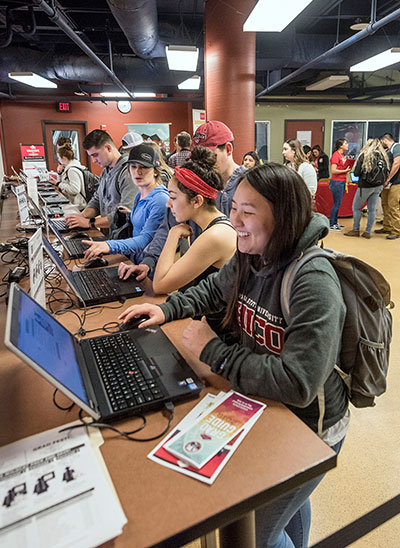The Standard Scheduling Convention (PDF) is designed to create a class schedule that will allow students the best opportunity to have as many classes as possible without conflict. It also provides for the most optimal use of campus rooms and allows us to easily "swap" general use lecture spaces for classes as necessary for enrollment and other needs. The use of standard times decreases the likelihood of time conflicts which have the potential to reduce access to required classes and thereby delay a student’s progress to degree.
Non-standard class times impact campus room utilization by reducing the number of classes that can be offered in a room during the day and/or week. Per EM 20-018 on Facilities Allocation and Utilization, III.1., “The academic purposes of the institution will be supported by practices that promote the sustainable utilization of all its facilities.
Realizing there are additional, short-term, factors that impact a department’s ability to offer classes in a given semester, the department may temporarily adjust a class schedule to a non-standard meeting pattern. The college dean should be consulted, and the dean’s approval must be communicated to Academic Publications and Scheduling Services (APSS).
Requests for permanent non-standard scheduling require deeper consideration, and the decision and rationale must be captured as part of a course’s permanent record. This documentation helps ensure long-term equity in course offerings from a campus level perspective. Therefore, approvals must be communicated to APSS and may be reviewed by or discussed further with the Academic Scheduling Advisory Committee (ASAC).
How to request approval for a non-standard day/time (meeting pattern)
If the need to schedule a class for a non-standard meeting pattern overrides the impact on student schedules and room utilization, the department must receive the dean’s approval to do so. The scope of the request determines the course of action and the required documentation of approval. In either case, APSS marks each approved section in order to clear audit.
Approvals must be in place and sections/courses marked PRIOR to scheduling a non-standard meeting pattern in a room, even during the priority scheduling period.
Classes with non-standard meeting patterns will not be given priority in general use lecture rooms, and:
- may be shifted to a different facility to maximize efficient use of space
- during scheduling by APSS, will be placed after all standard meeting pattern have rooms
- should be scheduled in Exclusive (college-specific) spaces if possible
Temporary, one semester requests for a non-standard meeting pattern:
Department should consult with their college dean about the need for a one-time approval for a class section non-standard day/time.
Please forward dean’s approval to APSS and include the following information and language in your communication. You may use any format (e.g. email, Adobe Sign) that ensures the required information is received by APSS prior to scheduling:
Semester/Year:
Class and Section:
Instructor:
Meeting pattern requested:
The Chair and Dean have consulted on this request and agree that there is:
- Nominal impact to students’ access to required courses
- Nominal impact to students’ progress toward degree
- Nominal impact to sustainable facility use; every attempt has been made to schedule this section into an Exclusive space
As the approving authority for this temporary shift to a non-standard day/time, I acknowledge our campus priorities to students and facilities use and concur that the department’s one-time scheduling needs override or otherwise do not impact those priorities in this case.
Request for permanent non-standard days/times for a Course:
Permanent non-standard requests are more likely to be received without further discussion under these conditions:
- Course is always held in an Exclusive space, as evidenced by a 3-year course history
- Course is NOT a General Education course
In order to fully document the approved request:
- The Department ASC completes the Permanent Non-Standard Day/Time Scheduling Rationale and Approval (PDF), in consultation with the Department Chair. This form is not meant to replace Chair-Dean consultation.
- After consulting with the Dean, the Chair notifies the Department ASC to forward the form to the Dean, copying APSS, and requests the Dean "reply to all" with language approving the request.
- If Adobe Sign is employed, APSS should be copied on the final routing.
- This process is intended to be entirely digital, but the form is required.
- APSS updates the course as necessary and scans the fully executed form into our record system as part of the permanent course history.

